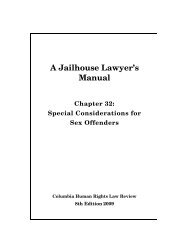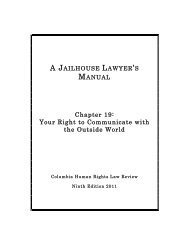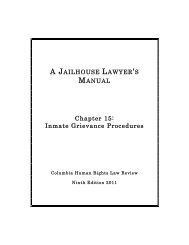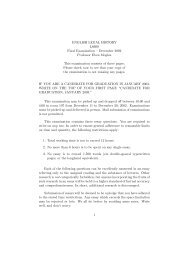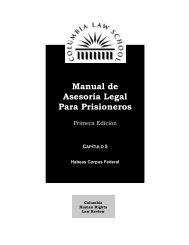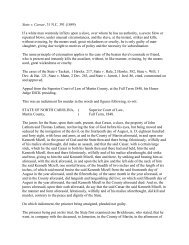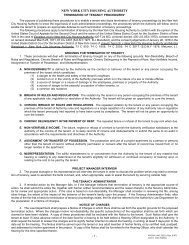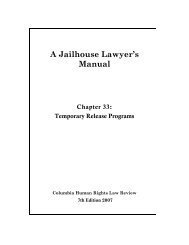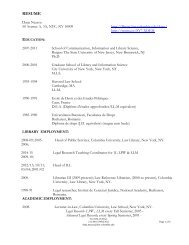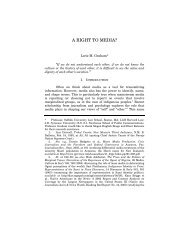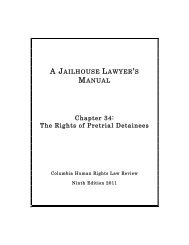The Right to Dignity Rex D. Glensy - Columbia Law School
The Right to Dignity Rex D. Glensy - Columbia Law School
The Right to Dignity Rex D. Glensy - Columbia Law School
Create successful ePaper yourself
Turn your PDF publications into a flip-book with our unique Google optimized e-Paper software.
2011] <strong>The</strong> <strong>Right</strong> <strong>to</strong> <strong>Dignity</strong> 109<br />
fundamental value underlying the U.S. Constitution.” 210 It is<br />
therefore quite inaccurate, both his<strong>to</strong>rically and analytically, <strong>to</strong> state<br />
that the right <strong>to</strong> dignity, or at least, the concept of dignity rights, is<br />
foreign <strong>to</strong> American legal thinking. 211<br />
<strong>The</strong> task is then <strong>to</strong> delineate the parameters of what a<br />
workable right <strong>to</strong> dignity might look like in America. Some have<br />
observed that the possible pervasiveness of dignity could affect so<br />
many different legal rules that it would be hard <strong>to</strong> count them all. 212<br />
In fact, the most hallowed of those rights enumerated in the<br />
Constitution could be easily thought of as having their germinating<br />
root in the idea of the right <strong>to</strong> dignity. It is undeniable that the<br />
adaptability of democracies <strong>to</strong> different systems of governance that<br />
nonetheless can and do accommodate a role for human dignity within<br />
their structure counsels in favor of the use of dignity rights in some<br />
fashion. Given the examples illustrated in Part II.B.2 above, it is<br />
clear that there are several options for the use of human dignity<br />
within the full corpus of a legal system: one can treat dignity as a<br />
right in and of itself, or as a general principle, or as a value<br />
210. Parent, supra note 131, at 47 (referring <strong>to</strong> both Ronald Dworkin and<br />
Justice Brennan); see also Resnik & Suk, supra note 68, at 1941 (arguing that the<br />
Supreme Court has “changed the content of United States constitutional law <strong>to</strong><br />
name dignity as a distinct and core value”). Although this proposition might be<br />
controversial as applied <strong>to</strong> the U.S., it certainly is not when it comes <strong>to</strong> the<br />
German Basic <strong>Law</strong> or the new South African Constitution. See e.g., Christian<br />
Walter, Human <strong>Dignity</strong> in German Constitutional <strong>Law</strong>, in Proceedings of the<br />
UniDem Seminar, Montpellier, July 2–6, 1998, <strong>The</strong> Principle of Respect for<br />
Human <strong>Dignity</strong>, European Comm. for Democracy Through <strong>Law</strong>, at 24, 26<br />
available at http://www.venice.coe.int/docs/1998/CDLSTD(1998)026e.asp (Ger.)<br />
(citing Germany’s Constitutional Court as considering the human dignity clause<br />
<strong>to</strong> be the highest value of the Basic <strong>Law</strong>); Dawood v. Minister of Home Affairs<br />
2000 (3) SA 936 (CC) at 961–962 35 (“dignity is not only a value fundamental <strong>to</strong><br />
our Constitution, it is a justiciable and enforceable right that must be respected<br />
and protected”).<br />
211. Andrew Clapham has identified four aspects of what could constitute a<br />
jurisprudence of human dignity: (1) proscriptions on degrading treatment of<br />
individuals; (2) guarantees pertaining <strong>to</strong> personal au<strong>to</strong>nomy; (3) protections on<br />
group identity; and (4) creation of conditions <strong>to</strong> meet an individual’s basic needs.<br />
See Andrew Clapham, Human <strong>Right</strong>s Obligations of NonState Ac<strong>to</strong>rs 545–46<br />
(2006). Each of these aspects could have a corollary legal rule associated with it<br />
within the purview of U.S. law.<br />
212. See, e.g., Hyman, supra note 1, at 5 (listing blue laws, capital<br />
punishment, cloning, decriminalization of drug possession, gay marriage,<br />
geneticallymodified food, gun control, legalized prostitution, partialbirth<br />
abortion, physicianassisted suicide, prohibition of hate speech, school prayer,<br />
school vouchers, state lotteries, and threestrikes laws as all having the potential<br />
of affecting, either positively or negatively, human dignity).



